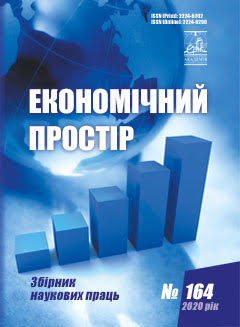DEVELOPMENT OF SECTORAL THEORIES IN THE STUDY OF THE STRUCTURE OF THE ECONOMY
Abstract
The article is devoted to sectoral theories of economic structuring, their evolution and development. It is emphasized that in the study of structural patterns of development of the national economy the theory of three sectors is widespread. International organizations use a three-sector model to characterize the country's economy and compare it with others, distinguishing between the agricultural, industrial and service sectors. The essence of the theory of three sectors in the process of civilizational development of society within the phase triad "pre-industrial – industrial – post-industrial" is highlighted. The evolution of the main provisions of the theory of three sectors and the contribution of A. Fischer, K. Clark, J. Furastier to its development are revealed. The comparative characteristic of grouping of aggregated types of economic activity into primary, secondary and tertiary sectors and criteria of structuring of economy are presented. The role of each sector in the development of the country's economy is emphasized. Emphasis is placed on the heterogeneity of the tertiary sector and its role in solving the unemployment problem. It is proved that the reason for the growth of employment in the service sector is the increase in demand not so much for consumer as for production services. The structural changes taking place in the economy have led to the development of the theory of three sectors in the study of the structure of the economy, which went by a deeper study of the tertiary sector and its detail. The concept of post-industrial society is revealed, in which education, science, information become of paramount importance in the development of the country's economy. Five- and six-sector models of economic structuring are described. Within these models, the development of the knowledge economy was recognized as a priority of public policy. Three blocks of the state social and economic policy for development of economy of knowledge are defined. It is determined that the development of the sectoral structure of the national economy takes place against the background of dialectical laws, under the influence of dynamism and sustainability. It is proved that the change of relations between sectors is accompanied by profound qualitative changes in each sector, the structure of the economy as a whole, which translates it to a new level of development. Emphasis is placed on the need to identify growth poles in each sector of the national economy.
References
Бажал Ю.М. Знаннєва економіка : слово та діло : термінологія має значення. Монітор конкурентноспроможності. 2008. № 1–2. С. 67–70.
Белл Д. Грядущее постиндустриальное общество. Опыт социального прогнозирования. Москва : Academia, 2004. 788 c.
Мальська М. Теоретико-методологічні засади оцінки місця і ролі сфери послуг у системі національної економіки країни. Вісник Львівського університету. Серія міжнародні відносини. 2011. Вип. 28. C. 253–261.
Чухно А.А., Юхименко П.І., Леоненко П.М. Сучасні економічні теорії : підручник. Київ : Знання, 2007. 878 с.
Central Intelligence Agency. The World Factbook (2019). Economy. URL : https://www.cia.gov/library/publications/the-world-factbook/geos/gm.html
Colin, Clark. Conditions of Economic Progress. London : Macmillan and Co. & Co. Ltd Sent Martin’s Press, 1940. 515 p.
Colin, Clark. Conditions of Economic Progress. Third edition largely rewritten. London : Macmillan & Co. Ltd New York Sent Martin’s Press, 1960. 720 p.
Fisher, Allan G. B. The Clash of Progress and Security. London : Macmillan & Co. Ltd Sent Martin’s Street, 1935. 235 p.
Fisher, Allan G. B. Production, Primary, Secondary and Tertiary. Economic Record. Vol. 15, Issue 1. 1939. Р. 24–38.
Fourastie J. La progres technique et revolution economique. Paris. 1958.
Porat M., Rubin M. The information economy: development and measurement. Washington : Government Printing Office, 1977. 130 p.
The Lisbon Review (2002), An Assessment of Policies and Reforms in Europе, Geneva: World Economic Forum. Retrieved from: URL : http://www.weforum.org/pdf/Gcr/LisbonReview/ LisbonReview_2002.pdf
Bazhal Yu.M. (2008) Znannieva ekonomika : slovo ta dilo : terminolohiia maie znachennia. [Cognitive economics: word and deed: terminology mat-ters] Monitor konkurentnospromozhnosti, no.1–2, рр. 67–70 (in Ukrainian).
Bell, D. (2004) Griadushchee postindustrialnoe obshchestvo [The coming post-industrial society] Opyt sotsialnogo prognozirovaniia. Moscow : Academia. (in Russian).
Malska M. (2011) Teoretyko-metodolohichni zasady otsinky mistsia i roli sfery posluh u systemi natsionalnoi ekonomiky krainy. [Theoretical and methodological grounds assessment place and role of services in national economies system] Visnyk Lvivskoho universytetu. Seriia mizhnarodni vid-nosyny, no 28, рр. 253–261. (in Ukrainian).
Chukhno A.A., Yukhymenko P.I., Leonenko P.M. (2007) Suchasni ekonomichni teorii : pidruchnyk. [Modern economic theories] Kyiv: Znannia (in Ukrainian).
Central Intelligence Agency. The World Factbook (2019). Economy. URL: https://www.cia.gov/library/publications/the-world-factbook/geos/gm.html
Colin, Clark. (1940) Conditions of Economic Progress. London : Macmillan and Co. & Co. Ltd Sent Martin’s Press, 515 p.
Colin, Clark. (1960) Conditions of Economic Progress. Third edition largely rewritten. London : Macmillan & Co. Ltd New York Sent Martin’s Press, 720 p.
Fisher, Allan G. B. (1935) The Clash of Progress and Security. London : Macmillan & Co. Ltd Sent Martin’s Street, 235 p.
Fisher, Allan G. B. (1939) Production, Primary, Secondary and Tertiary. Economic Record. Vol. 15, Issue 1. Р. 24–38.
Fourastie J. (1958) La progres technique et revolution economique. Paris.
Porat M., Rubin M. (1977) The information economy: development and measurement. Washington : Government Printing Office, 130 p.
The Lisbon Review (2002), An Assessment of Policies and Reforms in Europе, Geneva: World Economic Forum. URL: http://www.weforum.org/pdf/Gcr/LisbonReview/LisbonReview_2002.pdf



